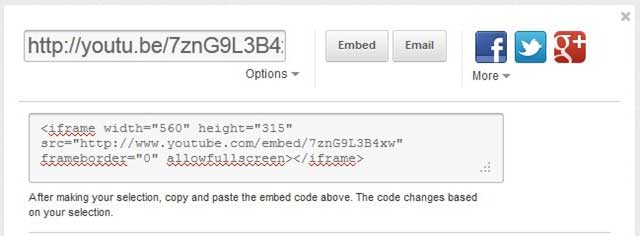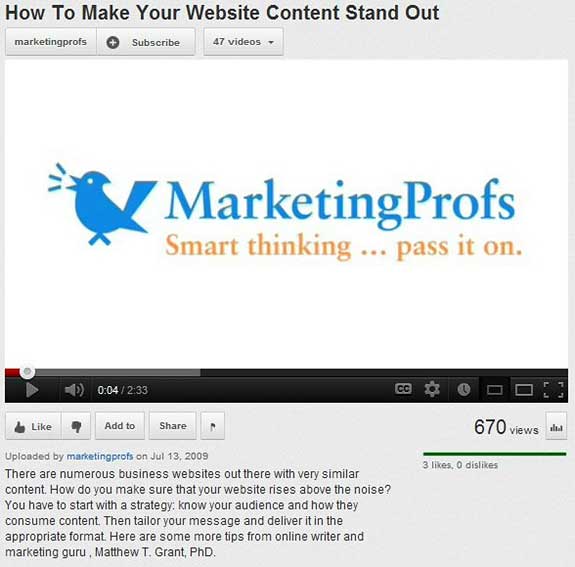Online video should be an essential part of every business's online marketing strategy. Because producing a video can be expensive, make sure you get as much bang for the buck as you can when you release it.
Of course, everyone wants a video that goes viral, but no matter how much time or money you spend on production, there is no proven formula for creating a blockbuster. Fortunately, there are some strategies you can employ to get your video in front of as many viewers as possible.
1. Create a video people want to share

Videos do not become viral because of their production quality or content. Videos become viral because something about them compels people to watch them and share them over and over. Among the key characteristics of a viral video are the following:
- Viral videos are typically short. Though you have the option of uploading a 15-minute-long video to YouTube, you don't necessarily want to do that. Unless a celebrity is involved or you are making a music video, you will want to keep your video short, like the typical viewer's attention span. Two things to keep in mind: the average attention span, according to The Associated Press, is very short indeed—8 seconds—and the average length watched of a single Internet video is 2.7 minutes.
- Viral videos are funny. People like to laugh, and they like to make others laugh. Your video will more likely be shared if it is humorous or quirky.
- Viral videos tie into current events and trends. If everyone is talking about something in your industry, you should be creating a video about it. Creating content around trending topics is a great way to get your video exposure on social media sites and search engines.
- Viral videos are useful. Every video you create (unless it's purely for entertainment) should solve a problem. If you're solving a key problem that a lot of people seek an answer to, they will be likely to share your video with others who have the same problem.
2. Promote your video to existing leads, clients, and contacts

If you have a video to promote and an email list, make sure everyone on your mailing list knows about the video. Deliver an e-newsletter mentioning the video directly to their inbox.
Though you can't easily embed the video in your email, you can include a video thumbnail (see above) that links directly to your video on your website, ideally on a custom landing page. For extra exposure, have your employees include a link to the video in their email signatures.
3. Make your video as easy to share as possible

Whenever you upload your video to services like YouTube, Vimeo, Wistia, or others, make sure that the embedding or sharing options are enabled. Choose video networks that allow for other forms of sharing, including through social networks.
The easier it is for someone to share your video, the more likely it will be shared.
4. Optimize your video for search

Here are three tips to help you optimize your video for search engine exposure:
- Use keyword-optimized video titles, descriptions, and tags for each of your videos.
- Create a page on your website to showcase your videos (see the MarketingProfs video page).
- Create individual pages for each video on your website, including the text transcript of the audio portion of the video.
5. Prepare a promotional plan to share your new videos

Image courtesy of S. Falkow
Promoting your video across social media channels can seem a very daunting task. But it won't be if you create a simple plan.
Start with the main social networks: Twitter, Facebook, LinkedIn, and Google+. Then think of additional ways to get specific people to notice. If someone previously asked you about a how-to tutorial, then tweet them @theirusername on Twitter to let them know you just created it. If you mention other people or companies in your video, tweet them or tag them in your Facebook updates.
Key Takeaways
To summarize, here are the five things you need to do to maximize the chances that your video will be seen and shared multiple times:
- Create a video that everyone will want to share because it's helpful, it's funny, or it picks up on a current trend.
- Prepare a plan for social media promotion of your video across all major social networks.
- Promote your video via email newsletters (and your email signature) to leads, clients, and vendors.
- Make your video as easy to share as possible by ensuring the networks you use to host it offer social sharing, and by embedding options on both the video page and embedded video players.
- Optimize your video for search so your video can be found by prospective clients searching for particular keywords or your brand.
Additional Resources
Want to learn more about creating viral videos and measuring the results? Here are some good resources:



